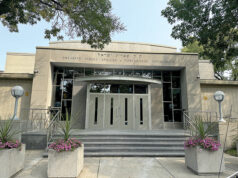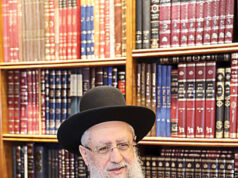 My name is Nissim Mishan, though I’m better known as Nat Mishan. I was born in Aleppo, Syria. I immigrated to Israel in 1945, the same year Syria got her independence from France.
My name is Nissim Mishan, though I’m better known as Nat Mishan. I was born in Aleppo, Syria. I immigrated to Israel in 1945, the same year Syria got her independence from France.
Fearing that there would soon be unrest for the Jews in Syria, the Mishan family of nine decided to embark on the road to Israel. The visa to travel was not easy to obtain. My family split into small groups and secured different ways and means to immigrate. My father and I traveled to Beirut, Lebanon and the next day, in the early evening, we went with 10 other men and women on a journey by foot that took us across the border into Israel. It took us 20 hours, climbing mountains and hills, walking through farms, until we got to Kibutz Hanitha in Israel.
Lebanese frontier guards on horses missed us by a very short distance. Members of the kibutz argued with them, claiming that we were members of the kibutz working alongside the wiring. The next day, English policemen tried to entrap us on a bus to Tel-Aviv, but they did not succeed. We already had our ID cards in Hebrew and we were wearing khaki kibutz clothing, holding Hebrew newspapers. We looked like all the other Israelis.

It took me no time to immerse myself in their culture. Knowing Arabic fluently, I was admitted to work for the foreign ministry of Israel. At the time, my friend Joseph Ades worked there and Moshe Sharett (future prime minister of Israel) was head of the department. My job was to translate information from Arabic to Hebrew, which was then sent to the Department of Security. I have to admit, the Histadrut employment agency directed me to the perfect job. I was inspired.
 The Mishan family was devoted to Eretz Israel from day one. In 1945 we were asked to change our names to Hebrew names. My mother did not hesitate for a moment and registered our names as follows: My mother’s name was Latife, which became Adina. My father’s name was Murad, which became Mordechai. My brother Edward became Avner. Brother Mitchele became Michael, my sister became Amaliah and Fortune became Mazal.
The Mishan family was devoted to Eretz Israel from day one. In 1945 we were asked to change our names to Hebrew names. My mother did not hesitate for a moment and registered our names as follows: My mother’s name was Latife, which became Adina. My father’s name was Murad, which became Mordechai. My brother Edward became Avner. Brother Mitchele became Michael, my sister became Amaliah and Fortune became Mazal.
May 15, 1948 at 4:00 pm—that date and time will stay forever in my heart. I stood on the steps of the Sochnut in Sderot Rothchild by Allenby Street in Tel-Aviv, listening to the loud speaker announce the independence of the State of Israel by David Ben Gurion. People were screaming in joy and happiness and dancing around thrilled in the streets—it was beyond belief.

All of this didn’t last very long, because five adjacent Arab countries immediately declared war on Israel. Lebanon, Syria, Egypt, Jordan, Iraq and other local Arab fanatics attacked Israel.
All were called to join the army. My mother, may she rest in peace, sent all four of her sons to join the army. Her words were, “be careful.” To my sorrow, we went as four brothers, but only three returned. I lost my youngest brother, Moshe who was only 18 years old.
My fate was to join Gibaati Batallion, regiment 51, plugah dalid. My ID number was 27911. A friend of mine from school, Yehoshua Cohen, joined at the same time and his ID number was close to mine, 27909.
At the assembly in the camp, I was chosen to be sent for a very short time to a training camp where I returned to my unit as a corporal, then a sergeant at war, and sergeant major after the war. The rules in the army were that you didn’t tell the soldiers to go forward or go left or right, you just said, “follow me.” Leading first, I could have stepped on a booby trap or gotten killed by a sniper. My unit fought in the south. Our first encounter with the enemy was at Tel-Assafe, a village over a mountain.

Poorly armed, with limited ammunition, I remember having barely 50 bullets for myself, and even fewer for the boys behind me. We walked at night, advancing to challenge the enemy. As we got closer, we noticed that the enemy was running away. The Egyptian soldiers and civilian men alike, were running and yelling in Arabic “Ejaw il yehud fi elwad”—the Jews have come and they are at the mountain end. I was stunned. My heart was pounding and my eyes were open wide to see and sense a miracle—Hashem yellachem lachem ve’atem tacharishun (The almighty G-d will fight for you and you will keep quiet). I saw the miracle with my own eyes, I felt it and I held it, and I’m alive. G-d made me live to tell others about the miracle.

Not wasting time, I took with me a platoon of 18 soldiers, and I advanced towards the houses, to clear the village in order to make sure there were no surprises by the enemy. I screamed to them in Arabic to get out before I blew up their homes. Soon, mobs of women and children surrounded me, and suddenly from nowhere I saw a young man in his early twenties in front of me. I told him in Arabic, “arfac eidak” (hands up). I didn’t notice that one of his hands was closed. Behind me stood Haim Salame (may he rest in peace). He yelled in Arabic that the young man had one of his hands closed. Within a second, I shot him. He fell at my feet. They walked over to him to open his hand and found tobacco, which he held to take with him as a prisoner.
At war, you don’t know how many you kill from a distance, but I knew I killed him.

Getting back to the miracle that I mentioned—with me were a soldier from Morocco, one from Poland, one from Greece, one from Holland, one from Italy, and others from all over the world. We all spoke different languages and could not understand each other, yet our enemy ran away from us. And G-d in His majesty by Himself was the Warrior. And the miracle was big.
One time, I was taken to a room where those in charge showed me a map made of sand placed on a large table, indicating mountains, hills and passages in between. My job was to go at midnight to an Iraqi enemy location. Once there, I had to collect information about the enemy encampment, their trenches, tents, places of food, their washrooms and their instillation points of defense. This was to be fresh information because the next night the enemy location was to be attacked.
That day I gathered a platoon of 14 soldiers and prepared them for the operation. The order was not to be discovered at any time and to get killed rather than shoot at the enemy. The enemy was not to discover our actions.
With a compass on my left wrist and 14 soldiers that I chose all blackened with charcoal covering our faces and hands, so we wouldn’t be discovered, we moved at midnight to discover the target. I used the compass as a guide, as instructed, and we got there fairly easily. At the enemy location I collected all the information demanded of me and I discreetly returned with my unit to the camp. As I was approaching our camp, I found enemy units coming back from our location, talking loudly in Arabic and immediately my group of 14 soldiers got down and hid. The enemy was also in small numbers, passing within a very short distance of us. I could have killed each and every one of them, but as I was ordered, I was not allowed to shoot at them. They bypassed us and continued telling stories loudly in Arabic to one another. Immediately I reported to my high command my findings. At midnight, the enemy location was attacked and destroyed. This action was over a 10 day period of ceasefire ordered by the United Nations.
I was lucky enough to have in service with me four Syrian boys: Yehoshua Cohen, Haim Cohen, Yitzchak Laniado and Haim Salame. Towards the end of my three years in service as sergeant major, I met Joe Braha and Jack Tamir. I also fought in 1956 as a reservist.
Today Israel is facing much stronger enemies, in quantity and quality, and there is much to worry about. Yet, if you walk down the streets, you will find a synagogue or two on every block and a black hat on every corner. You will find plenty of yeshivot everywhere. You will find that kosher restaurants are multiplying, young and old generations are going kosher, rabbis are leading their communities with bitachon (assurance from Hashem), and the miracle that was before will be again.



